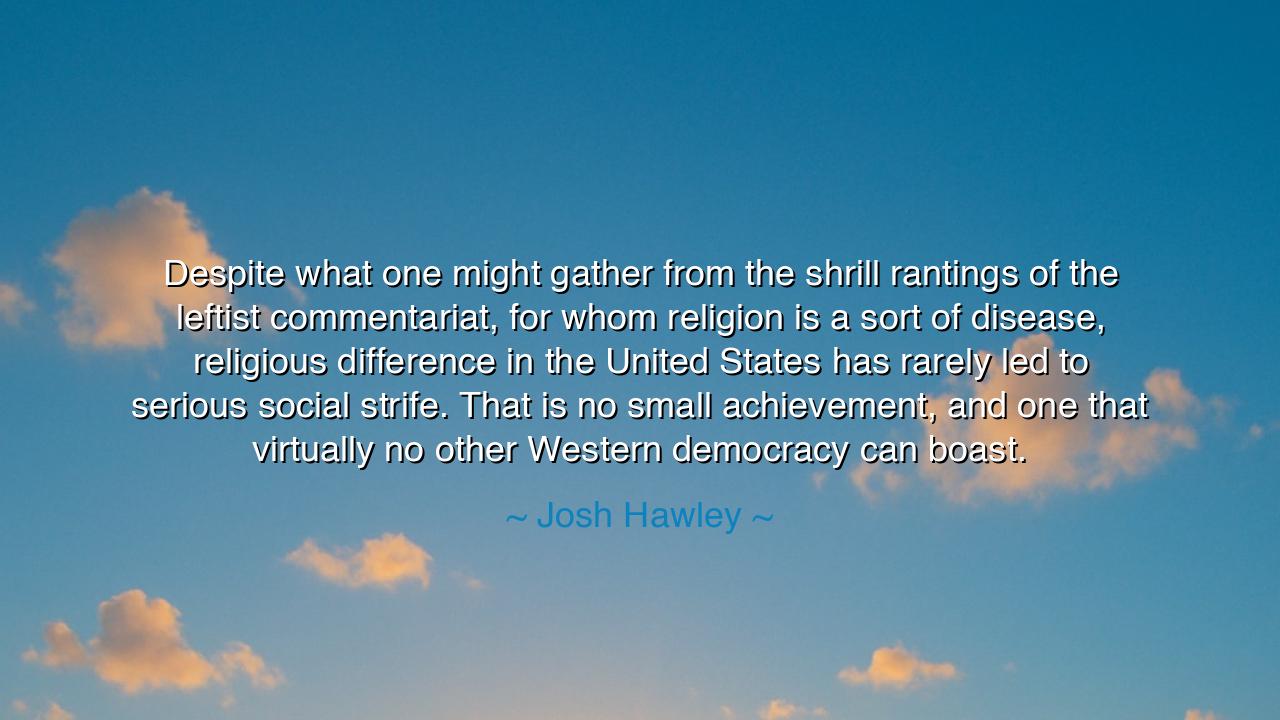
Despite what one might gather from the shrill rantings of the
Despite what one might gather from the shrill rantings of the leftist commentariat, for whom religion is a sort of disease, religious difference in the United States has rarely led to serious social strife. That is no small achievement, and one that virtually no other Western democracy can boast.






In the annals of human history, religion has been both a source of immense unity and a cause of profound division. Josh Hawley, in his observation, speaks to a unique achievement in the history of the United States, where, despite the often polarizing nature of religious identity, such differences have rarely descended into the depths of social strife. He argues that the American experience is distinct in how it has managed to sustain a fragile peace among its diverse religious communities, an accomplishment that no other Western democracy can so easily claim. Hawley's words remind us of the great and delicate achievement of a nation that, while deeply divided in many ways, has managed to retain a relatively peaceful coexistence between its varied religious traditions.
The ancient world, too, was no stranger to the tensions and conflicts arising from religious difference. In Rome, the imperial cult sought to unify the empire under the worship of the emperor, but tensions often flared between the traditional Roman polytheistic faith and the new, monotheistic religions that began to take root, most notably Christianity. The early Christians, steadfast in their belief in one God, were persecuted for refusing to worship the emperor or the Roman gods. Religious difference, when it threatened to undermine the unity of the state, often led to violence and bloodshed. Yet, even amidst such persecution, the Christian faith spread, largely because it offered something deeper than just religious observance: it offered a profound spiritual unity that transcended the divisions of class, race, and even empire itself.
The story of Constantine the Great is perhaps one of the most striking examples of how religious difference can evolve from division to unity. The emperor, once a staunch persecutor of Christians, famously converted to Christianity and issued the Edict of Milan in 313 AD, granting religious tolerance throughout the empire. This act did not only bring peace to the Roman Empire but also marked the beginning of the Christian faith’s rise to become the dominant religion in the Western world. Constantine’s reign, therefore, stands as a testament to the potential for religious difference to be transformed into a force for unity, rather than division.
The American experiment with religious freedom is equally remarkable. From the very founding of the nation, there was a recognition that religious diversity could not only coexist but could enrich the national identity. The First Amendment enshrined the principle of religious liberty, ensuring that the government would neither endorse nor interfere with religious practices. This founding principle allowed various faiths—Protestants, Catholics, Jews, Muslims, Hindus, and many others—to flourish on American soil. The promise of freedom—to worship without fear of persecution, to build communities based on shared faith—became a cornerstone of American identity.
Even when religious differences have led to friction, as they have in various moments of American history, the resilience of the American spirit has often been sufficient to defuse the worst of the tensions. The Civil Rights Movement of the 1960s, for example, saw religious leaders like Martin Luther King Jr. call for unity, not just on the grounds of racial justice, but also on the principles of brotherhood, compassion, and peace rooted in religious and spiritual teachings. King’s commitment to nonviolence and unity drew from the profound belief that, despite their differences, all humans were brothers and sisters under one God. Even the deep divides of the Civil War, which were partly rooted in religious and cultural differences, ultimately gave way to the reconciliation of a nation struggling to heal and move forward.
Hawley’s reflection on religious diversity in the United States, then, is not merely a political observation but a call to recognize the unique peace that has been achieved. Unlike many other nations in the West, where religious differences have often sparked violence, oppression, or cultural exclusion, the United States has managed to balance this diversity with a sense of unity. This is no small achievement, as it takes courage, compassion, and a deep sense of common purpose to live together in harmony despite profound differences in belief and practice.
The lesson to be drawn from both history and Hawley’s words is clear: religious differences are inevitable in any society, but they need not be divisive. If history has taught us anything, it is that tolerance, understanding, and a commitment to shared human values—such as justice, equality, and peace—can lead us toward a more inclusive society. Just as the ancients learned the importance of respecting diverse religions for the sake of the greater good, so too must we in the modern world find ways to foster unity and coexistence in the face of difference.
In our lives, let us take this lesson to heart. Let us celebrate the diversity of faith that surrounds us, not as a source of division but as a strength. By embracing the differences of others, by seeking understanding rather than judgment, and by nurturing a spirit of cooperation, we too can contribute to a society that reflects the wisdom of a peaceful coexistence, much like the one Hawley so thoughtfully acknowledges. Religious diversity does not need to tear us apart—it can, instead, bind us together in a shared pursuit of human dignity and peace.






AAdministratorAdministrator
Welcome, honored guests. Please leave a comment, we will respond soon